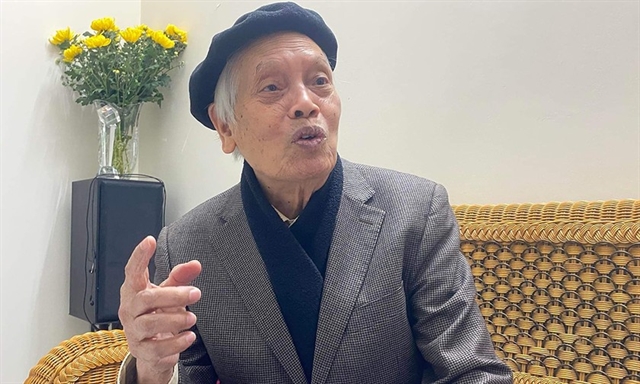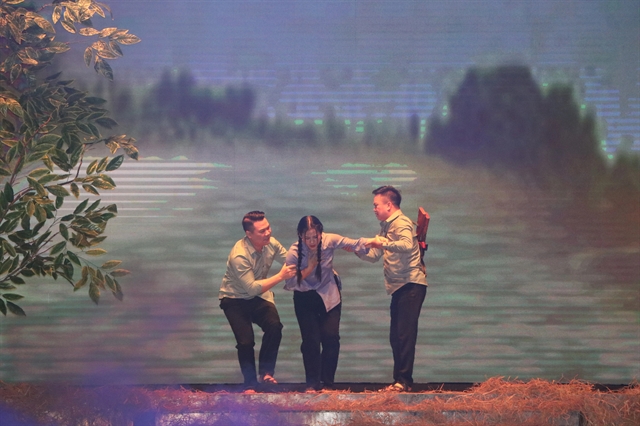His composition also includes symphonies, choirs and oratorios. His most recent work is Bài Ca Tình Yêu (Love Song) opera.

Veteran composer Doãn Nho.
Composer Doãn Nho is a veteran of Việt Nam's modern music. His songs are popular, including Chiếc Khăn Piêu (Piêu Scarf), which he wrote in 1955. The song won the Award Song of The Year at a television show titled Bài Hát Việt (Vietnamese Songs).
His composition also includes symphonies, choirs and oratorios. His most recent work is Bài Ca Tình Yêu (Love Song) opera.
The composer spoke about opera development in Việt Nam.
Your new work Love Song debuted when you are 90 years of age. Could you tell me about the work?
I had a PhD in art at Kyiv Conservatory. I want to use my knowledge to compose academic music pieces. I have composed the pieces during my career.
I was inspired by an article in Tiền Phong (Vanguard) newspaper to write the opera Love Song. The story tells about love, friendship and patriotism in wartime.
I had written the opera for three years. It is a tribute to soldiers who sacrificed for national independence and freedom.
What do you like most about the opera?
I combine traditional art genres such as cải lương (reformed opera), tuồng (classical opera) and chèo (popular opera) and Western music standards.
One of the factors of Vietnamese traditional theatre is humourous. Spanning years, Vietnamese people still like watching chèo, cải lương and tuồng because they find joyfulness and optimism through buffoon characters.
I want to make an opera that is easy to enjoy.

Love Song opera debuted last December at Hà Nội Opera House. Photo courtesy of Việt Nam Musicians Association
The first Vietnamese opera Cô Sao (Miss Sao), by composer Đỗ Nhuận, was composed more than half a century ago. What do you think about opera composing and production in Việt Nam? Is it not paid enough attention?
I don't think so. As a professional, I think that opera has improved a lot. The first opera, Miss Sao, was composed by Đỗ Nhuận, who skillfully adapted Western opera rules to the Vietnamese singers' timbre.
Other operas were made including Bên Bờ Krông Pa (By Krông Pa Riverside) by Nhật Lai in 1968; Đỗ Nhuận's Người Tạc Tượng (Sculptor) in 1971; Tiếng Đàn Thạch Sanh (Thạch Sanh's Musical Instrument Sound) by Đức Minh in 1985; Người Giữ Cồn (The Island's Watchman) by Ca Lê Thuần in 2014; Lá Đỏ (Red Leaf) by Đỗ Hồng Quân in 2016 and the most recent Khát Vọng Đam Săn (Đam Săn's Desire) by Nguyễn Cường in 2021.
However, opera is rarely performed because of many reasons. The difficulties are budget, artists and audience. Producing and performing an opera requires long time of hard work and dedication. Moreover, opera audiences need an ear for music.
I finished the opera Love Song in 2014, but it only debuted last year.
In your opinion, what is needed to develop opera in Việt Nam?
My teacher, composer Đỗ Nhuận advised me that folk music and the unique dialects are principals of composing a musical piece. He wrote lyrics for his operas. He not only wrote the lyrics for his opera Miss Sao, but also joined its production work.
His work inspired the next generation and contributed to developing opera in the country.
I want to emphasise that composers should know about enjoying the performance and the aesthetics factor aiming at bringing opera closer to the public.
Plus, we should focus on training because it is one of the most important and basic foundations to develop opera.
Do you have any plan for the coming time?
Love Song is my contribution to developing opera. When I studied abroad, I thought about writing Vietnamese music theory. I have been researching and writing a book on Vietnamese music theory.
Some of my colleagues and I are working on completing the book. We want to publish it and have a chance to introduce it to music schools. - VNS